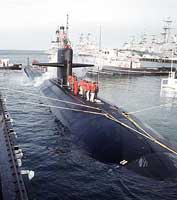 The most interesting question about the recently revealed cheating scandal on personnel training exams on the nuclear-powered fast attack submarine, USS Memphis, is whether the cheating was an isolated case or whether the practice is more widespread. The Navy says the former is the case while officers and sailors interviewed by the Associated Press disagree.
The most interesting question about the recently revealed cheating scandal on personnel training exams on the nuclear-powered fast attack submarine, USS Memphis, is whether the cheating was an isolated case or whether the practice is more widespread. The Navy says the former is the case while officers and sailors interviewed by the Associated Press disagree.
Cheating scandal hits US submarine
When the Navy discovered a cheating ring aboard one of its submarines, it swiftly fired the commanding officer and kicked off 10 percent of the crew.
Navy officials describe the case aboard the USS Memphis as a rare lapse in integrity, but some former officers say the shortcuts exposed by the scandal are hardly unique to a single vessel.
The former submariners tell The Associated Press it is not uncommon for sailors to receive answer keys or other hints before training exams. They say sailors know how to handle the nuclear technology, but commanders competing with one another to show proficiency have made exams so difficult – and so detached from the skills sailors actually need – that crew members sometimes bend the rules.
One of the former officers, Christopher Brownfield, wrote in a book published last year that his superiors aboard the USS Hartford urged him to accept an answer key to pass a nuclear qualification exam. He said other crew members received answers by email, and the sub’s leadership ignored him when he complained about cheating.
“It was almost universal,” Brownfield said in an interview. “I don’t know anybody on the ship who could have passed that exam without cheating on the first try.”
As an instructor at the Navy’s submarine school in Groton in 2005, Brownfield said he heard from members of roughly a dozen other crews that cheating also took place on their boats. He blamed pressure to hit ever-higher performance targets.
“They’ve expected more and more paperwork, with higher levels of compliance, and over time those expectations diverged from what people are actually doing,” said Brownfield, who is now researching nuclear sustainability as a graduate student at Columbia University. “In the nuclear department, the test became so difficult it really had no bearing on what people were doing on a daily basis.”
